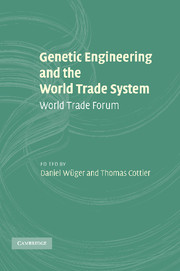Book contents
- Frontmatter
- Contents
- List of contributors
- List of abbreviations
- PART I Introduction and systemic issues
- PART II Intellectual property and gene technology: issues at stake and possible options
- PART III Food security, trade and agricultural production with genetically modified organisms
- 7 Biotechnology in the energy sector: some implications for developing countries
- 8 Coexistence and liability: implications for international trade drawn from the Swiss example
- 9 Food security and agricultural production with genetically modified organisms: a comment
- PART IV Food safety, international trade and biotechnology
- PART V Medical research, cloning and international trade
- Index
8 - Coexistence and liability: implications for international trade drawn from the Swiss example
Published online by Cambridge University Press: 06 October 2009
- Frontmatter
- Contents
- List of contributors
- List of abbreviations
- PART I Introduction and systemic issues
- PART II Intellectual property and gene technology: issues at stake and possible options
- PART III Food security, trade and agricultural production with genetically modified organisms
- 7 Biotechnology in the energy sector: some implications for developing countries
- 8 Coexistence and liability: implications for international trade drawn from the Swiss example
- 9 Food security and agricultural production with genetically modified organisms: a comment
- PART IV Food safety, international trade and biotechnology
- PART V Medical research, cloning and international trade
- Index
Summary
Coexistence as a general problem
Coexistence in agriculture is an old problem which is receiving renewed attention due to the increased awareness of the impact that chemicals are having on the environment and the specific problems associated with modern genetic engineering. Basically, coexistence is a relationship between different types of production which could have an impact on each other. It concerns only the individual farmers involved, not the State. Its obligations under international law are not affected.
Coexistence could be:
‘traditional’ agriculture coexisting with organic farming;
‘traditional’ agriculture coexisting with farming using genetically modified organisms (GMOs);
agriculture using GMOs coexisting with organic farming.
GMOs are therefore only one additional feature of the problem, but serve to highlight the increasing difficulty of maintaining side by side agricultural activities which are less and less consistent with one another. Whether the coexistence is more difficult because of the greater variety of crops, because of increasing use of chemicals which are more specifically linked with certain crops, or whether it is due to legal requirements, such as the fact that GMOs are banned from organic farming, does not make a substantial difference. The impact of one type of farming technique on the others is no longer limited to the traditional question of ‘pollution’ or ‘overspilling’ on the neighbouring land. The impact of one farming technique on another can mean substantial changes in the nature of neighbouring agriculture or even irreversible alteration of the biological environment.
- Type
- Chapter
- Information
- Genetic Engineering and the World Trade SystemWorld Trade Forum, pp. 175 - 192Publisher: Cambridge University PressPrint publication year: 2008

